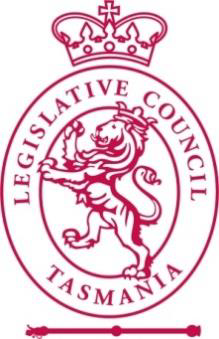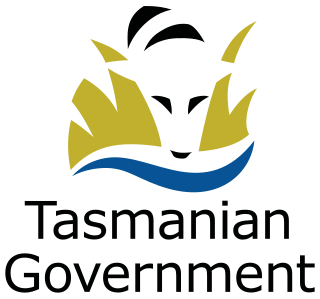Related Research Articles

A coroner is a government or judicial official who is empowered to conduct or order an inquest into the manner or cause of death. The official may also investigate or confirm the identity of an unknown person who has been found dead within the coroner's jurisdiction.

The Tasmanian Legislative Council is the upper house of the Parliament of Tasmania in Australia. It is one of the two chambers of the Parliament, the other being the House of Assembly. Both houses sit in Parliament House in the state capital, Hobart. Members of the Legislative Council are often referred to as MLCs.

Risdon Prison Complex is an Australian medium to maximum security prison for males located in Risdon Vale near Hobart, Tasmania. The facility is operated by the Tasmanian Prison Service, an agency of the Department of Justice of the Government of Tasmania. The facility accepts criminals convicted under Tasmanian and/or Commonwealth legislation.

The Tasmanian Government or the Government of Tasmania is the executive branch of the Australian state of Tasmania. The leader of the party or coalition with the confidence of the House of Assembly, the lower house of the Parliament of Tasmania, is invited by the governor of Tasmania to form the executive. The governor appoints the premier of Tasmania.

The Supreme Court of Tasmania is the highest State court in the Australian State of Tasmania. Together with the Magistrates Court, it forms the judiciary in Tasmania. In the Australian court hierarchy, the Supreme Court of Tasmania is in the middle level, with both an appellate jurisdiction over lower courts, and decisions made by Court to be heard on appeal by the High Court of Australia.

Jacob Bruce "Jake" Kovco was a private in the Australian Army who was killed while deployed to Iraq, fatally wounded by a single shot to the head from his own Browning 9mm sidearm. He was the first Australian soldier to die while deployed to the Middle East Area of Operations. A military inquiry found Private Kovco accidentally shot himself while mishandling his pistol. This conclusion was disputed by his family and on 2 April 2008, a second inquest returned a similar verdict, finding that his death was "irresponsibly self-inflicted", and that when he pulled his gun's trigger he "disregarded the possible consequences of danger".

The Coroner's Court of New South Wales is the court in the Australian state of New South Wales where legal proceedings, in the form of an inquest or inquiry, are held and presided over by the State Coroner of New South Wales, a Deputy State Coroner of New South Wales, or another coroner of the state of New South Wales.
A coroner's jury is a body convened to assist a coroner in an inquest, that is, in determining the identity of a deceased person and the cause of death. The laws on its role and function vary by jurisdiction.
The Coroner's Court of Western Australia is a court which has exclusive jurisdiction over the remains of a person and the power to make findings in respect of the cause of death of a person in Western Australia.
The name of "Coroners Court" is the generic name given to proceedings in which a Coroner holds an inquest in Victoria.

The Coroner's Court of South Australia is a court which has exclusive jurisdiction over the remains of a person and the power to make findings in respect of the cause of death of a person or fire in South Australia, a state of Australia.

The Coroners Court of Queensland is a court in the court hierarchy of Queensland, Australia. The Court has exclusive jurisdiction in Queensland over the remains of a person and to make findings about the cause of death of a person.

The Coroner's Court of the Australian Capital Territory is a court which has exclusive jurisdiction over the remains of a person and the power to make findings in respect of the cause of death of a person or fire in Australian Capital Territory.
The title of Coroners Court is the name given to proceedings in which a coroner holds an inquest or an inquiry in the Northern Territory.

The Magistrates Court of the Australian Capital Territory is a court of summary jurisdiction that deals with the majority of criminal law matters and the majority of small civil law matters in the Australian Capital Territory, the Jervis Bay Territory and the Australian Antarctic Territory.
Shan Eve Tennent is a former Australian judge. She was a Judge of the Supreme Court of Tasmania between March 2005 and October 2017, and was the first woman to be appointed to the Court.
An inquest is a judicial inquiry in common law jurisdictions, particularly one held to determine the cause of a person's death. Conducted by a judge, jury, or government official, an inquest may or may not require an autopsy carried out by a coroner or medical examiner. Generally, inquests are conducted only when deaths are sudden or unexplained. An inquest may be called at the behest of a coroner, judge, prosecutor, or, in some jurisdictions, upon a formal request from the public. A coroner's jury may be convened to assist in this type of proceeding. Inquest can also mean such a jury and the result of such an investigation. In general usage, inquest is also used to mean any investigation or inquiry.
The Judiciary of Sri Lanka are the civil and criminal courts responsible for the administration of justice in Sri Lanka. The Constitution of Sri Lanka defines courts as independent institutions within the traditional framework of checks and balances. They apply Sri Lankan Law which is an amalgam of English common law, Roman-Dutch civil law and Customary Law; and are established under the Judicature Act No 02 of 1978 of the Parliament of Sri Lanka.
Margaret Anne Hunter is a Special Magistrate of the Australian Capital Territory. She was appointed as a special magistrate and coroner on 21 May 2014.
The Integrity Commission is a Tasmanian integrity agency established in 2010 to deal with complaints about public sector misconduct.
References
- ↑ "Coroners and Morgue". Archived from the original on 8 December 2007. Retrieved 29 July 2020.
- ↑ sections 59 & 59A, Coroners Act 1995
- ↑ section 7, Coroners Act 1995
- ↑ .Annual Report of the Tasmanian Magistrates Court